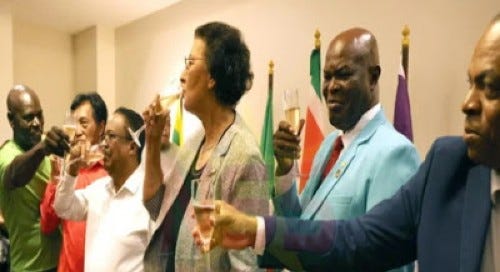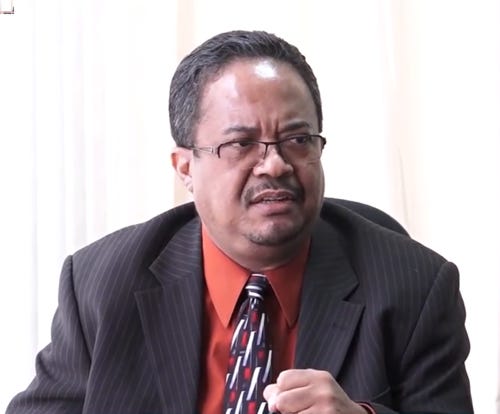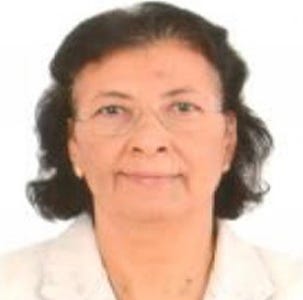More foreign affairs in a crazy, mixed-up world
Suriname elections update: Bouterse's old party intent on kicking out Santokhi
It is still too early to make a definitive call on the results of Sunday’s national election in Suriname—South America’s smallest country—but the smart money is already betting on an almost-improbable coalition between mouldering former dictator Desi Bouterse’s old party, the NDP, and everybody else in the new parliament EXCEPT the current president’s party, the VHP.
What seemed barely possible before the election—and indeed, highly improbable just a few days ago—seems remarkably close to reality. The new coalition codeword’s acronym seems to be EBS—Everybody But Santokhi—and a two-thirds majority of 34 votes for the country’s first female president as soon as the new National Assembly convenes.
Dr. Jennifer Geerlings-Simons, a longtime leader of the NDP, seems close to patching together the odd-bedfellows coalition—by melding her party’s 18 seats with 16 votes from every party on the political spectrum except VHP, including three parties that used to support Chan Santokhi’s government, and even helped him win the presidency in 2020—but now seem to have deserted him.
Parbo beer, anyone? The new coalition toasts its own health in Suriname after signing up. Courtesy Caribbean Today
The final votes had not yet been counted or announced on Wednesday, making Simons’ prediction of a coalition still reasonably shaky—and Santokhi’s hopes of winning a second term not completely dead, just on life support, and Dr. Geerlings-Simons all too willing to pull the plug if she gets the chance.
If VHP miraculously wangles one more seat out of the still-being-counted votes, the game goes into overtime. An 18-18 tie, leaving just 15 “other” seats, would make it mathematically impossible for eiher the NDP or VHP to construct a coalition—except with each other.
What is clear, however, are the Judas roles being played by Vice President Ronnie Brunswijk, who sold his soul to Santokhi in 2020 to get his current job—but whose party lost significant ground on Sunday, and is betting his only hope for keeping the job lies in selling it yet again—and Santokhi’s onetime coalition partner, Gregory Rusland, the redoubtable U.S.-educated professor and shrimp salesman.
Brunswijk, a convicted drug smuggler and more recently, gold mining millionaire, may be playing with a poor third- or fourth-place hand—just five (or six?) seats to bargain with—and now running neck-and-neck or just behind Rusland, leader of the National Party of Suriname (NPS), which apparently won six seats on Sunday.
Rusland, Santokhi’s coalition “running mate” in their unsuccessful attempts in 2010 and 2015, is apparently still hungry for the number-two job. He last ditched Santokhi’s government in 2023, after losing the v-p job to Brunswijk in 2020, and remains an odds-on bet to ditch Geerlings-Simons’ coalition if he fails to land the number-two job this time.
Wannabe-vice president Gregory Rusland of Suriname. Public domain photo
The remaining parties—the Alternative 2020 party (A20), the Brotherhood and Unity in Politics (BEP) party, and the Pertjajah Luhur Party (PL)—together won the remaining handful of seats needed to make up the 34 votes. [See “A new coalition challenges Suriname's president after a close election,” May 28, https://abcnews.go.com/International/wireStory/new-coalition-challenges-surinames-president-after-close-election-122268257 . ]
A page back in time ... is a reader-supported publication.
To receive new posts and support my work,
consider becoming a free or paid subscriber.
* * * * * *
As a “reformed” Foreign Service Officer—I walked away from the U.S. State Department in 1997—I keep my eyes out for unusual and outrageous events occurring in countries of interest to the United States, particularly those I have served in or visited. This often includes analyses of U.S. actions affecting those countries, whether wise or effective—or neither, as here—and in many recent cases, more puzzling than practical.
I served at the U.S. Embassy in Paramaribo for two years, from 1989 to 1990, and found the political situation childishly perplexing back then. Since dictator Bouterse stepped down as leader in 1987, when his party lost control of the National Assembly, the country had been dominated by a weak, ineffective and only nominally democratic government—with Bouterse continuing to control the strings as head of the military, even deposing one elected president by telephone in 1990.
The U.S. attitude toward Suriname in recent decades has been all but ineffectual, characterized by regularly inept dealings with the string of governments it considered mostly a thorn in its side—occasionally dangerous, but mostly to be ignored or barely tolerated for lack of a realistic alternative during the Bouterse years.
In its second term, the Trump administration placed all its poorly-conceived poker chips on somehow helping Chan Santokhi win a second term—greedily assessing a future relationship with a suddenly-rich country—by sending Miniscule Marco Rubio down for a less-than-a-day-on-the-ground visit with Santokhi in March: determined to talk big and rid Suriname of Chinese foreign assistance—with nothing to offer in its place but vague promises of U.S. private investment—if Suriname did not install Huawei telecommunications equipment.
The hapless and perspiring Secretary of State preened before the cameras long enough to build up Santokhi’s fading image marginally before jetting off again. He did not bother to meet with the opposition at all, a rookie’s error. Then he brought the stick but forgot the carrot. Another wasted trip by a man who simply doesn’t have a clue …
If the NDP coalition does hold up through the expected presidential vote next week, after the nationwide vote is finalized, it could produce the 34 votes needed to vault Simons into the presidency—with not one vote to spare. According to a late report in the usually-authoritative Caribbean Life, however, the six-party coalition is united only by its desire to be rid of Santokhi’s regime, reportedly riddled with corruption. [See “Suriname forms new coalition,” May 28, https://www.caribbeanlife.com/suriname-forms-new-coalition/?utm_source=sailthru&utm_medium=email&utm_campaign=caribbeanlife-pm&utm_term=Caribbean%20Life%20Daily%20Newsletter .]
But the running joke in Suriname for decades has been that corruption lies only in the eyes of the beholder—that the entire system is so corrupt that only those in office can possibly see themselves as not corrupt—and then only by not looking in the mirror. Even if Geerlings-Simons wins, she will find herself beholden to some pretty devious and corrupt individuals—including former First Lady Ingrid Bouterse-Waldring, who had once been rumored to be her strongest competition if the NDP managed to win the most votes on Sunday.
According to Caribbean Today, leaders of the six parties joined Geerlings-Simons Tuesday night to sketch out their plans for the next five years, which Geerlings-Simons pledged would offer “an opportunity to do things differently” with “good governance, transparency and accountability in all government functions [as] the first priorities, and
with the declaration of intent stating that corruption in all its forms must be identified and combated. It states that concrete measures will be taken to prevent and tackle corruption.
The new coalition intends to strengthen the institutional framework. The capacity of public institutions must be supported, while the independence of the judiciary, impartiality and enforcement of the law must be guaranteed. The coalition aims to align economic and social policy programmes and develop strategies that take into account both the short-term and long-term goals of the economy and society.
[See “Suriname moves closer,” May 28, https://www.caribbeantoday.com/sections/politics/suriname-moves-closer-to-having-a-new-coalition-government / .]
]
Dr. Jennifer Geerlings-Simons, NDP leader and presidential contender in Suriname. Public domain photo
Just what she had to agree to to get EBS on board will probably never be known—a scattering of ministers’ posts will be announced soon, of course, something for everyone, with the rest decided by handshakes and winks in private, off-the-books favors. The real trade-offs will only become clear in the long run—especially after the oil royalties start pouring in.
Dr. Geerlings-Simons, 71, is an imposing figure: a former member of the National Assembly, elected regularly from 1996 to 2020, when she announced her initial retirement from politics. From 2010 to 2020, she was the Speaker of the rubber-stamp National Assembly. In 2024, years after leaving the Assembly, she was elected chairman of the NDP. She holds a medical degree from the Anton de Kom University, Faculty of Medicine, Paramaribo.
If elected, she would become the first female president of Suriname, and would join a small group of current female heads of government and state in the Caribbean, including fellow Caricom members Barbados (Prime Minister Mia Mottley and President Sandra Mason); and Trinidad and Tobago (President Christine Kangaloo and Prime Minister Kamla Persad-Bissessar)—joined by Anguilla’s Prime Minister Cora Richardson-Hodge, head of government in that British Overseas Territory.
Her “prize,” if you can call it that, will be to survive long enough to begin dispensing the first massive royalties from Suriname’s new offshore oilfields—slated to begin production by 2028—while somehow keeping Suriname out of another bankruptcy like that engineered by profligate spending during the two-term presidency of the late, unlamented Desi Bouterse. It will not be easy. She, after all, helped carry his legislative water for a decade.
The onetime dictator bamboozled his way back into power in 2010—with First Lady Bouterse-Waldring by his side as his salaried partner-in-crime, borrowing heavily from China and building homes for the poor, among other extravagances in a beggar’s wet dream—but died in disgrace five months ago, while a fugitive from a 20-year prison sentence for murder. After being on the run for nearly a year, he turned up dead in a basket on his widow’s doorstep Christmas Eve, a victim of his own longtime substance abuse, apparently floated upriver by friends in the dark of night as a bizarre sort of Christmas present.
Most outsiders will doubtless wish Geerlings-Simons good luck if she gets the job, but few will expect much of consequence from her achievements as she struggles to shed the murderous legacy of one predecessor—whom she served faithfully and without complaint for two decades—and the corruption of another, whom she left politics to get away from in 2020. She won her seat and resigned in 2020, so fed up was she back then.
This time around, she seems energetic, and maternal, even grandmotherly, and almost convincingly trustworthy at times. But she is, after all, a politician at heart, when she is not busy treating patients. Her bedside manner will now certainly need a heavy dose of luck—and a spine of steel—if she is to succeed at fulfilling either task.
And only then if she can look at herself in the mirror with a straight face …
Next time: African Americans join the nation’s political game: An introduction, circa 1864






